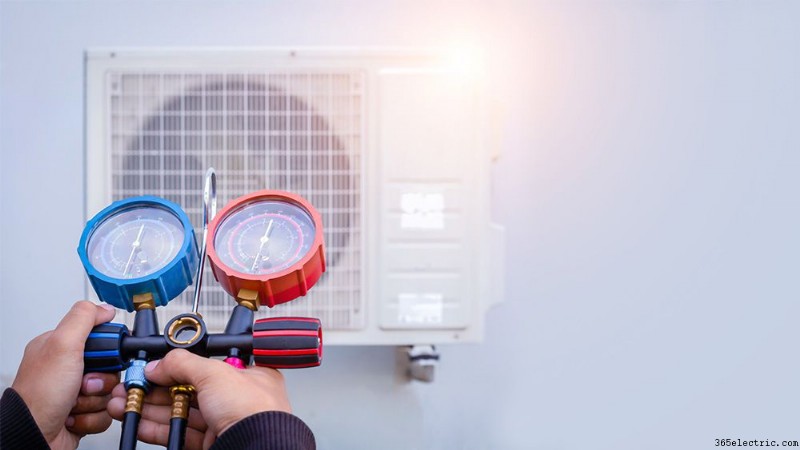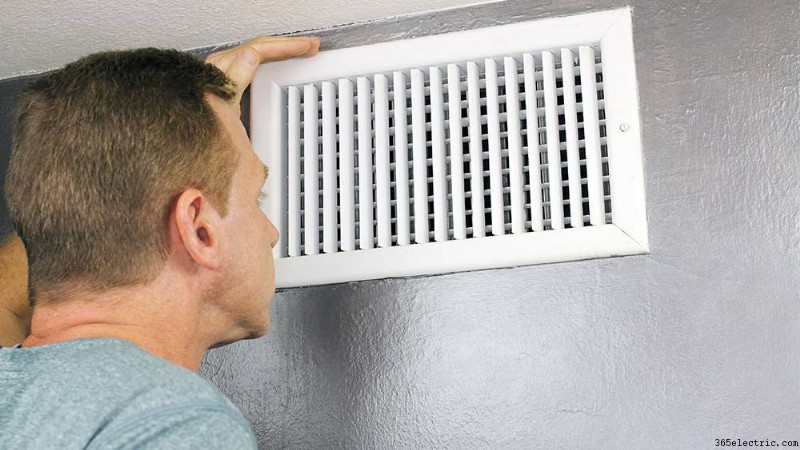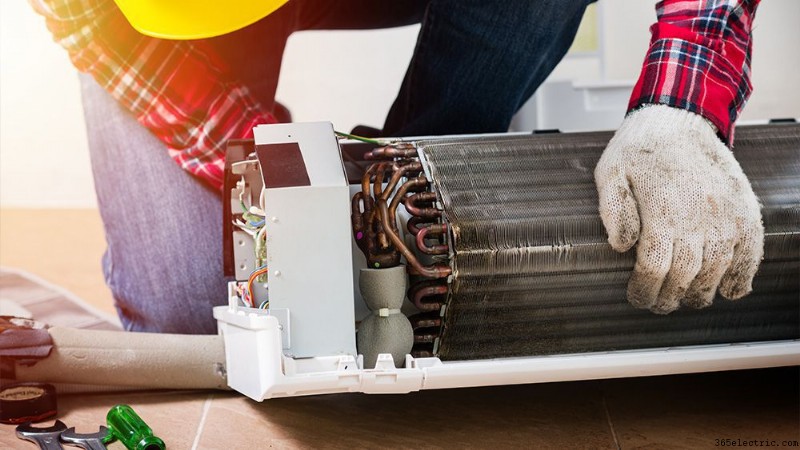冷媒漏れとは?決して無視してはならない AC 冷媒漏れの 11 の兆候

クーラントまたはフレオンとも呼ばれる冷媒は、間違いなくエアコンの最も重要な部分です。 AC 冷媒は、屋内の空気から熱を吸収して屋外に排出し、冷気を供給する化合物です。冷気 (可逆 AC の場合は熱) を供給するためにエアコンのさまざまなコンポーネントを通過する際に、流体から気体へとその状態を変化させます。
ダクト付きエアコンでもダクトレス エアコンでも、冷媒を使用して家を冷やします。
場合によっては、AC 冷媒が漏れて、AC の冷却能力が著しく損なわれることがあります。エアコンが十分に冷えていない、請求書が突然高くなった、水が滴り落ちた、または以下で説明するその他の兆候に気付いた場合は、AC 冷媒の漏れを確認する必要があります。
冷媒漏れが疑われる場合、または後でトラブルを避けるために事前に知りたい場合は、この記事が役に立ちます。探索:
- エアコンの冷媒漏れの危険性
- 冷媒または AC フロン漏れの原因
- エアコンの冷媒漏れの兆候
- 冷媒漏れが疑われる場合の対処法
- AC クーラントの漏れを防ぐ方法
AC 冷媒漏れの危険性
フロンには味も匂いもありませんが、私たちと私たちの周囲に影響を与えます。冷媒の漏れは、環境、健康、および HVAC ユニットに有害です。
環境への危険
CFC はオゾン層を破壊することが判明したため、段階的に廃止されました。しかし、それらはハイドロフルオロカーボン (HFC) とハイドロクロロフルオロカーボン (HCFC) に置き換えられましたが、これらには独自の問題があります。それらは非常に強力な温室効果ガスです。たとえば、一般的な冷媒である HFC 134-a の地球温暖化係数は、二酸化炭素の 3400 倍です。現在、R410A 冷媒またはそのアップグレード版に切り替えられていますが、多くのエアコンは依然としてフロンまたは HFC で構成されています。
冷媒の漏れを防止し、すぐに修理することは、寿命が来たエアコンを責任を持って廃棄することと同様に、HVAC ユニットの環境への影響を軽減するのに大いに役立ちます。
人体への危険
フロン漏れは間違いなく健康被害につながります。詰め替えの場合は、専門家のみが取り扱う必要があります。かなりの時間冷媒にさらされると、「冷媒中毒」に苦しむ可能性があります。偶発的な冷媒中毒はまれですが、潜在的な危険性を認識しておく必要があります。軽度から中等度の冷媒中毒の症状には次のものがあります:
- 頭痛
- めまい
- 嘔吐
- 吐き気
- 咳
- 目、耳、喉の炎症
冷媒漏れによる偶発的な冷媒中毒を避けるために、できるだけ早く漏れを修理してください。
重度の冷媒中毒は、冷媒をレクリエーショナル ドラッグとして使用する人々の間でのみ一般的であり、意識の喪失、発作、昏睡、または突然死を引き起こす可能性があります。
空調ユニットの危険
冷媒は冷却剤であるため、エアコンの冷媒漏れは AC のパフォーマンスに大きな影響を与える可能性があります。
空調ユニットのフロンが少なくなると、ユニットのコンポーネントに負担がかかります。 AC ユニットは、設定温度を達成するためにより多くの作業を行う必要があります。これを長時間無視すると、コンプレッサーの故障につながる可能性があります。また、AC コイルの凍結、請求額の増加、および全体的な冷却効率の低下を引き起こす可能性もあります。
冷媒または AC フロン漏れの 4 つの原因
フロン漏れの背後には多くの原因があります。冷媒は、時間の経過とともに使い果たされたり枯渇したりするものではありません。冷媒が漏れる小さな穴につながる問題のために漏れます。最も一般的な原因には次のようなものがあります:
1. ACユニットの損耗
エアコンの冷媒漏れは経年劣化が主な原因です。時間の経過とともに、AC のジョイントと接続が弱まり、侵食される可能性があります。さらに、サービス バルブやアクセス フィッティングの周りのゴム製シールが摩耗して、冷媒が漏れる可能性があります。
Moreover, if you delay or neglect HVAC repairs and maintenance for a long time, you will face this issue sooner than expected.
2. Pinhole Leak
Also known as ‘Champagne leaks’ since they create tiny bubbles, pinhole leaks are very minute holes in your AC coils. They normally occur in older units as a result of degradation over time and the main cause is certain acids such as Formic formed by Volatile Organic Compounds (VOCs) that are generally present in the air. Products such as air fresheners, glues or paints contain VOCs making it very easy for them to reach your indoor air conditioning unit. Overtime, these can eat or corrode your AC’s copper tubing causing tiny leaks.
Due to the vulnerability of copper tubing to VOCs forming formic acid, manufacturers are starting to switch to aluminum coils.
3. Vibrations
Your compressor motor, located outside, is an important component of your AC. If your outdoor unit is improperly sealed, it can generate severe vibrations, weakening refrigerant lines. Moreover, if your refrigerant lines were improperly installed in the first place, even mild vibration caused by the system’s running could wear holes in the copper coils, leading to an AC refrigerant leak.
4. Physical Damage
Children, animals, and lawnmowers have the potential to cause damage to your outdoor unit. In addition, lawnmowers can project their cuttings towards the outdoor unit, leading to debris build-up. Children and animals can accidentally hit or throw something while playing. This can also cause all sorts of physical damage. To prevent any damage to your outdoor AC unit, surround it with a block wall or install it higher up.
Read our guide to learn how to hide the air conditioner unit outside.
11 Signs of an AC Refrigerant Leak
Has your AC been acting up recently, and you can’t figure out why? If your AC isn’t turning on or its performance has taken a hit, a leaking refrigerant might be the cause to blame. Here are some signs your AC may have an air conditioner coolant leak:
1. Decreased Cooling Ability
The refrigerant absorbs heat from your home and releases it outside. If you have low refrigerant levels, effective heat transfer cannot take place. Thus, if your air conditioner has suddenly lost its cooling ability and doesn’t narrow down to any other cause, a refrigerant leak may be to blame.
2. AC Not Blowing Cold Air

A quick test is to place your hand right in front of your vents. If the air coming from the vents feels warm and you’ve tried everything to fix it but failed, then your AC could have a Freon leak.
3. Long Cooling Cycles
When your AC has a refrigerant leak, it often has a harder time reaching the set temperature on the thermostat. As a result, your HVAC unit must run longer than usual to achieve the desired temperature. If you notice your air conditioner is taking too long to reach a certain temperature, it’s best to get it checked.
4. Low Airflow
Place your hand directly in front of your AC vents. If the air is cold, but the airflow is too low, you may have a refrigerant leak. An air conditioner with a coolant leak cannot produce as much cold air as normal. While there may be many causes behind poor HVAC airflow, it may be due to a leak if everything else seems fine.
5. Unexpectedly High Electricity Bills
Due to a lack of coolant, your AC needs to work harder to cool your room effectively, leading to higher electricity bills.
If your electricity bills have skyrocketed despite no change in consumption, an HVAC refrigerant leak could be to blame. Increased bills indicate your AC is working longer than normal to reach your desired thermostat settings.
6. Frozen Evaporator Coils

Notice your AC freezing up even at the peak of summer? When refrigerant levels are too low, the evaporator coils cannot absorb heat adequately. As a result, the condensation on the coils freezes. Thus, ice crystals on the evaporator coils are often the result of a refrigerant leak.
7. AC Leaking Water
When your AC stops running, the frozen condensation on the evaporator coils melts, and water drips on the floor. If you didn’t notice you had frozen evaporator coils, a puddle of water on the floor near your HVAC unit is also indicative of a refrigerant leak.
8. Increased Indoor Humidity
Dehumidification is a natural result of your air conditioner’s cooling process. A fully functional air conditioner begins to offer serious dehumidification benefits after 15 minutes of runtime. Thus, if your house suddenly feels humid, it’s a sign you have a refrigerant leak.
9. Hissing or Bubbling Sounds
A refrigerant leak is the result of tiny holes or cracks in the coils. When coolant leaks through these holes, due to its high pressure, it produces a hissing noise. If the leak is large enough, there may even be a bubbling or gurgling noise coming from your unit.
10. Tiny Bubbles in the Evaporator Coils
If your evaporator coil has tiny holes through which it is leaking refrigerant, you can detect them by a collection of tiny bubbles near the leak. These are also known as “champagne leaks” due to the presence of tiny bubbles.
11. A Sweet or Chloroform-Like Smell
Your sense of smell can be your strongest ally when attempting to diagnose problems with your air conditioner. Odd smells from your air conditioner often signal a deeper problem.
For example, most refrigerants have a sweet or chloroform-like odor. If you smell any of those, it’s time to contact a professional. However, some refrigerants are completely odorless, so keep an eye out for other signs as well.
What to Do if You Suspect a Refrigerant Leak?
Since refrigerant leaks can be hazardous, never attempt to fix them yourself. Always leave it to a certified HVAC professional. Be wary of any professionals who recharge the refrigerant without finding the source of the leak and fixing it.
The leak will reoccur, leading to expensive repairs in the future. A qualified technician will also be able to judge whether your air conditioner needs to be replaced or if it is worth fixing the leak.
How to Prevent a Refrigerant Leak?
Over time, pollutants and debris can build up on your coils, leading to the formation of formic acid. Formic acid can create holes in copper coils, leading to your air conditioner leaking refrigerant. Therefore, regularly cleaning your AC coils is the first step towards preventing an AC refrigerant leakage.
While refrigerant leaks mostly occur due to age-related wear and tear, you can still take some steps to prevent them. One of these is regular maintenance of your HVAC unit. Schedule annual maintenance, especially before the summer and winter seasons, to identify and repair any issue beforehand.
Though coolant leaks can put a damper on your AC’s performance, you shouldn’t be too worried. Once you know how to detect a refrigerant leak, you can easily contact an HVAC professional to fix it. Your AC will be up and running in no time! Just make sure it doesn’t get ignored for too long otherwise, you could end up with a bigger, more expensive problem.
